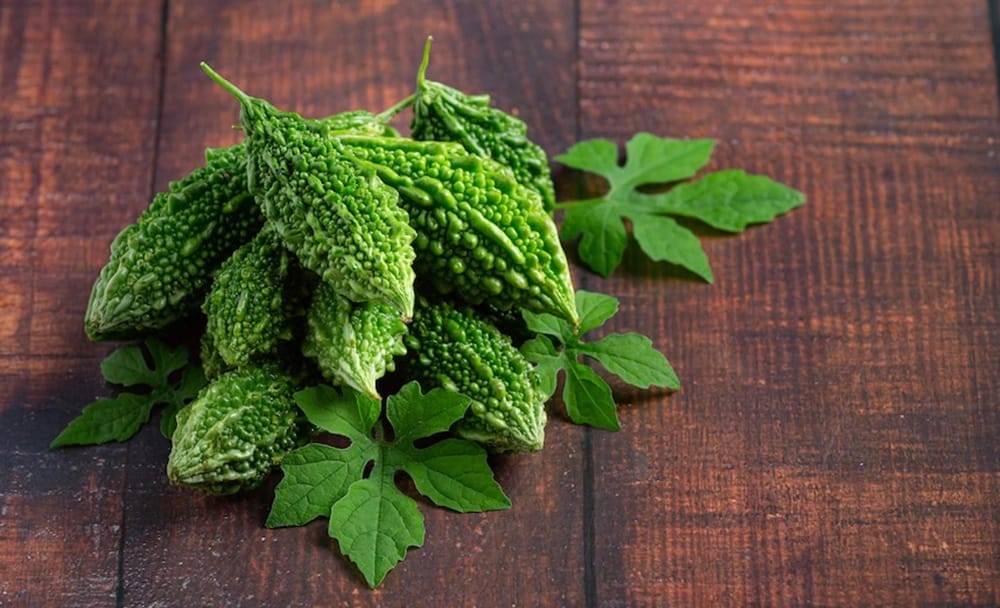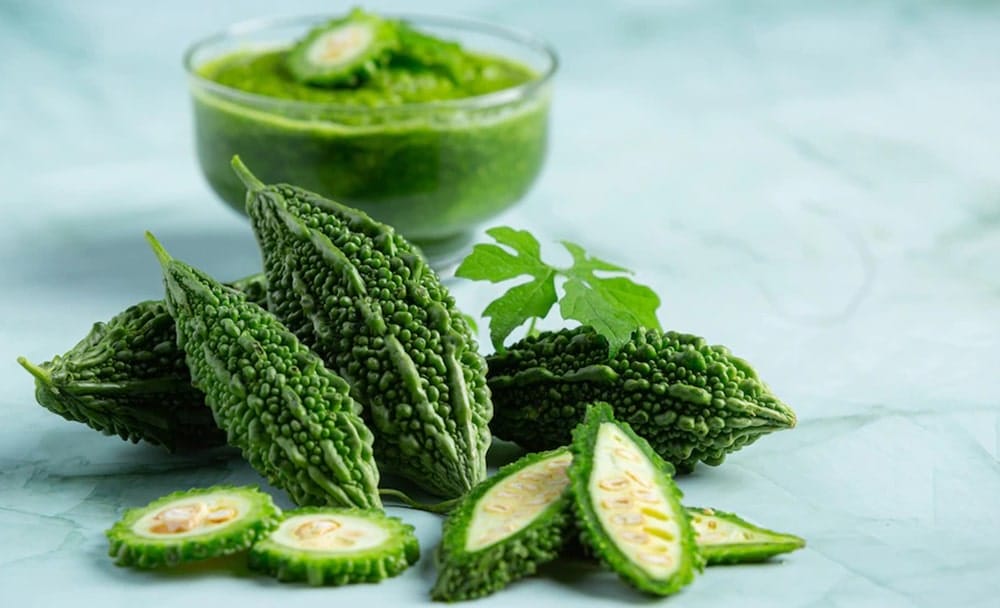
Karela is a perennial plant that typically grows in the tropical as well as subtropical regions of Asia, East Africa, South America, and the Caribbean. It is also commonly known as bitter melon, bitter gourd, bitter apple, bitter cucumber, balsam pear, and leprosy gourd. Its scientific name is Momordica charantia.
The edible fruit is used both as a food and in medicine to combat diabetes, viral infections, cancer, and immune disorders. Its characteristic bitterness is attributed to the presence of momordicines, momordicosides, and alkaloids. In vitro as well as animal studies suggest that karela has antidiabetic, antiviral, anticancer, and lipid-lowering effects, making it a superfood.
Let’s take a closer look at some of the diverse karela benefits.
- Powerhouse of Important Nutrients
Karela is a rich source of numerous key nutrients. One cup (approximately 94 grams) of raw karela provides 20 calories, 4 grams of carbohydrates, and 2 grams of fibre. It also provides some key vitamins and minerals, which account for a good percentage of the RDI (or Reference Daily Intake). Mentioned below are the percentage of the RDI values:
- Vitamin C (93%)
- Vitamin A (44%)
- Folate (17%)
- Potassium (8%)
- Zinc (5%)
- Iron (4%)
In addition, karela is an excellent source of catechin, epicatechin, gallic acid, and chlorogenic acid, which are potent antioxidant compounds that help in protecting your cells against potential damage.
- Can Help in Reducing Blood Sugar Levels
Because of its powerful medicinal properties, karela has long been used by Indigenous populations throughout the world to help treat diabetes-related complications.
Several studies have confirmed the role of karela in lowering blood sugar levels.
A three-month study in 24 adult individuals with diabetes demonstrated that consuming 2,000 mg of karela every day decreased blood sugar levels and haemoglobin A1C, which is a test to efficiently measure blood glucose control over the course of three months.
Another study involving 40 individuals with diabetes showed that consuming 2,000 mg of bitter gourd per day for four weeks led to a modest reduction in blood glucose levels. Moreover, the supplement successfully decreased levels of fructosamine, which is another marker of long-term blood glucose control.
That said, more studies are needed to comprehend how bitter gourd impacts blood glucose levels in the general population.

- Possess Cancer-Fighting Properties
Research indicates that karela contains specific compounds that are known to fight cancer.
For instance, one test-tube study demonstrated that the extract of karela was effective at killing cancerous cells of the stomach, lung, colon, and nasopharynx (which is the area that is located behind the nose at the back of your throat).
A subsequent test-tube study demonstrated similar findings, reporting that karela extract was able to successfully block the growth and spread of breast cancer cells, while simultaneously promoting death of cancerous cells.
That said, it is important to note that these studies were performed using concentrated amounts of karela extract on individual cells in a lab.
- Help in Decreasing Cholesterol Levels
High cholesterol levels may cause fatty plaque to accumulate in your arteries, forcing your heart to function harder when it comes to pumping blood, thus increasing your risk of heart disease.
Numerous animal studies have found that karela may help in decreasing cholesterol levels to support health of the heart.
- Its Versatility and Distinct Taste
Karela has a sharp, distinct flavour that works well in many dishes. One way to prepare it includes washing the fruit and then cutting it down lengthwise. You can then scoop out the seeds from the centre and cut the fruit into thin slices.
Karela can be enjoyed in both raw and cooked form.
Moreover, it can be baked, steamed, pan-fried, or even hollowed out and stuffed with fillings of your choice.
These bitter gourd benefits make it a superfood.
To Sum It All Up
Karela is also known as bitter gourd or bitter melon in the West. It is a powerhouse of vital nutrients, besides being a rich source of fibre. Studies have shown that consumption of karela on a daily basis can help in reducing blood sugar levels, fighting cancerous cells, and lowering cholesterol levels. Because of its distinct flavour, it can be used in a wide range of cuisines to prepare dishes that are unique in taste. Some individuals prefer the raw form of karela instead of the cooked form. Furthermore, it can be steamed, baked, or pan-fried or filled with a stuffing of your choice. More studies are needed to confirm the diverse health benefits of karela when used in everyday cooking.
Manage Diabetes With The Knowledge Of Ayurveda (Download Ebook)



















